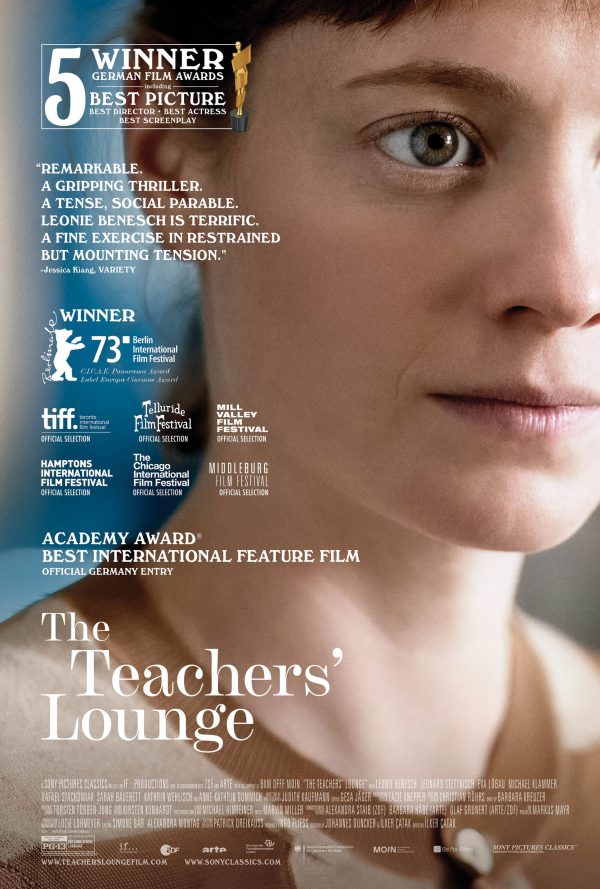
“The Teachers’ Lounge” (“Das Lehrerzimmer”) (2023). Cast: Leonie Benesch, Leonard Stettnisch, Eva Löbau, Michael Klammer, Anne-Kathrin Gummich, Kathrin Wehlisch, Sarah Bauerett, Rafael Stachowiak, Uygar Tamer, Özgür Karadeniz, Can Rodenbostel, Vincent Stachowiak, Elsa Krieger, Padmé Hamdemir, Oskar Zickur, Lewe Wagner, Lisa Marie Trense. Director: Ilker Çatak. Screenplay: Johannes Duncker and Ilker Çatak. Web site. Trailer.
But, even when a suspect is supposedly identified, the situation is still unresolved, only this time it involves the theft of teacher property, specifically items that go missing from the faculty lounge, to which no students have access. One of those affected is Ms. Nowak, who has money pilfered from her jacket pocket when she leaves it unattended on the back of a chair. She catches a break, however, when an image of the perpetrator’s distinctively patterned clothing is caught on her laptop camera, which was placed opposite the aforementioned chair and had been left on at the time of the theft. And, even though the thief’s face was not captured in the recording, it was easy to identify the individual in question given the outfit she was wearing – the culprit being one of the front office administrative aides, Frederike Kuhn (Eva Löbau).
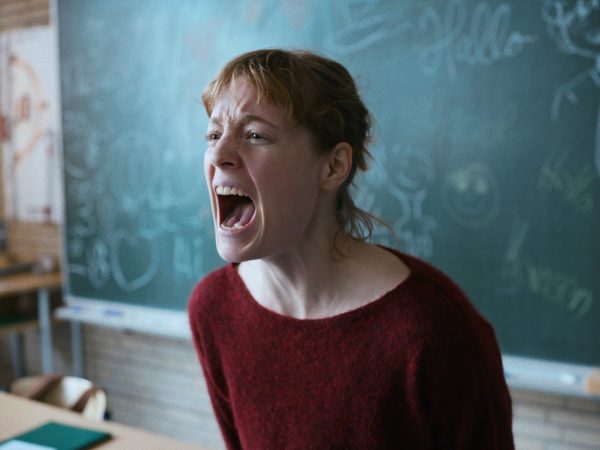
When Carla identifies Frederike as the offender, she confronts her but is immediately met with outrage and indignation. Frederike is insulted and incensed, throwing a fit. The mild-mannered Carla, meanwhile, calmly tries to defuse the situation, even going so far as to say that she would be willing to overlook the matter as long as Frederike returns the stolen money. But that solution falls flat when Frederike escalates the situation, necessitating Bettina’s involvement. And, when that doesn’t work, the principal mentions that this may become a matter for the police.
But this is far from the end of things. Frederike’s son, Oskar (Leonard Stettnisch), is one of Carla’s students, and he quickly gets drawn into the fray. It causes a strain in his relationship with his teacher, with whom he had previously gotten along well given the attention and recognition she gave him as one of her class’s best students. He goes through a change in attitude, becoming noticeably more belligerent and subsequently winning over the support of his classmates, who grow progressively more untrustworthy of and confrontational toward their teacher and even amongst themselves. There’s also a growing sense of racial, ethnic and social prejudice emerging in the classroom and at the school overall, a reflection of issues arising in contemporary German culture with the increasing arrival of immigrants and refugees from places like Eastern Europe and the Middle East. And word of all this, of course, eventually makes its way home to the parents of the pupils, who also grow skeptical about who’s teaching their kids, especially when physical harm surfaces.
Carla then learns that she may be in hot water with the faculty for having left her laptop camera running and recording them without their consent, an invasion of privacy issue. Needless to say, the staff becomes infuriated when word of this surfaces, even though nothing of consequence was filmed, making Carla a pariah among her peers. Suddenly the victim of a crime may be guilty of committing one herself. And the police – who were supposed to be investigating what happened to her – remain out of sight throughout all of this. So much for justice.
If all of that weren’t enough, Carla comes under further attack in the student newspaper. When interviewed for a previously scheduled article profiling the newly arrived instructor, she’s ambushed by the student journalists, who ask leading questions and make unsubstantiated accusations that end up in print as misleading reporting with quotes taken out of context. Like so many others in the public eye these days, Carla is charged, tried and convicted in the court of public opinion based on biased journalism, a victim of brutal character assassination. This development, coupled with everything that preceded it, leads to frenzied circumstances in which an individual who tried to quietly bring about an equitable, discreet solution to a containable incident is pushed to the edge. The molehill is now long since gone, with the mountain on view for all to see.
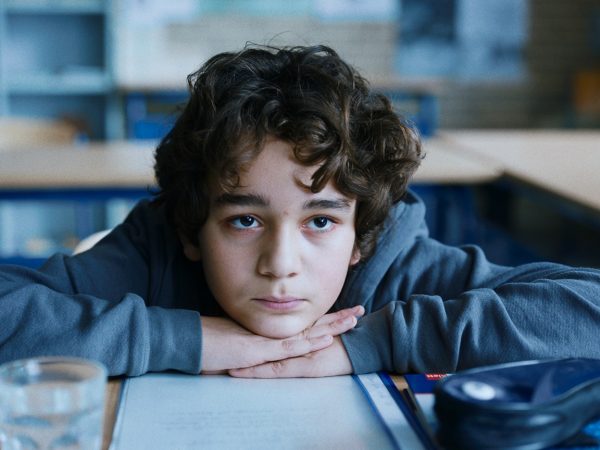
As I’ve noted many times before, it’s unclear how many of us are aware of this school of thought. However, even if we’ve never heard of it or made use of it, we may well sense its presence in our lives on a subconscious level. And, if we don’t like what we see in our existence, we might find the notion unsettling. To a certain extent, this may likely be the case where this story and this film are concerned, a possible explanation for why this picture has not been warmly received in many circles. Nevertheless, that may also account for the impact of this offering: It makes viewers uncomfortable because it hits a little too close to home. The result is that some audience members might find themselves squirming in their seats, making them feel as though this release is cutting through a lot of carefully layered camouflage and exposing us for who and what we believe – and are – in many respects, a response that reinforces the view that we don’t like what we see, particularly since it’s coming from us.
The exposure of underlying beliefs that yield the kinds of outcomes depicted here is a theme that has been – thankfully – gaining momentum in recent years, as evidenced in movies like this, as well as such other productions as “Don’t Look Up” (2021) and “Dream Scenario” (2023). They shine a bright light on us, serving as a mirror of ourselves, reflecting what’s really going on deep down inside us at the core of our beings. “The Teachers’ Lounge” shows how pervasive the impact of this can be, too, both on the grand stage of our world and in the little, everyday events that characterize our respective lives. Whether themes like those explored here are incorporated into big picture events or the small-scale happenings of daily existence, their effects are the same in each case, and we should be cognizant of that when it comes to the reality we manifest and subsequently experience.
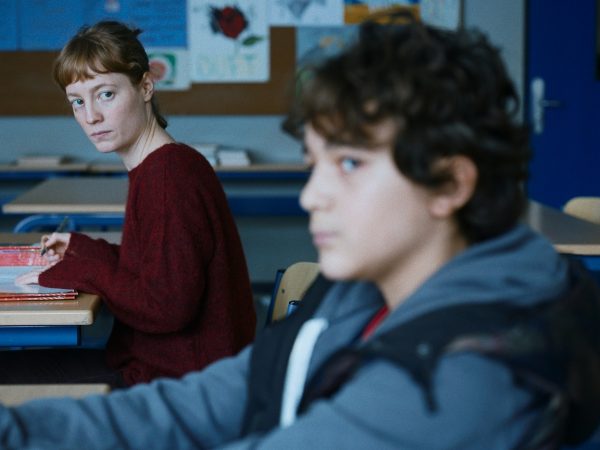
It may be tempting for some of us to dismiss this notion, especially when we see things about our existence that we don’t like – particularly about ourselves and what we materialize. However, given that these initiatives originate with us, we can’t realistically abrogate our responsibility for them and what unfolds from them as a result. There are many areas in which this is true in this story, many of them disturbing, especially when it comes to revealing aspects of ourselves and our beliefs that we find unflattering or intrinsically troubling. Hence the viewer discomfort with this title.
This film provides us with a look at how this all plays out both individually and collectively. In many regards, there are individual agendas at work that unfold over the course of the narrative. At the same time, these individual belief threads combine to form the essence of the larger, collectively generated scenario. And, considering the often-inflammatory nature of the various agendas, it becomes easy to see how and why they jointly grow into something larger and more troubling, with consequences that appear in myriad ways. Put another way, it’s easy to see how the molehill becomes a mountain.
We see scenarios like this popping up more often than ever before these days, again, whether on either grand or minor scales. Situations that start out small take on lives of their own, often with multiple components that each carry potentially significant implications and that, collectively, combine to make for unwarranted high drama. Circumstances that seem like they should be able to be handled with relative ease and simplicity swell into major confrontations, with emotions that run hot, heavy and adversarial over matters that are far from deserving of such attention and treatment. In this film, we see that occur with respect to not only the original criminal accusations, but also with a host of ancillary concerns that aren’t part of the initial conditions and somehow become wrapped up in the course of the overall story.
For example, what do elements like racial and national prejudice, the incendiary role of the media, the impact of unsubstantiated innuendo, the protection of personal privacy, the indulgence of contemporary youth, and the sway of fake news in shaping public opinion have to do with the petty theft of cash from someone’s jacket pocket? As all of this comes to light, the individual at the center of this scenario – Carla – is judged by those around her, including by some who have no direct bearing on the outcome of the seminal event, generally with distorted views and without all the pertinent facts, a situation similar to what unfolds in the recently released Japanese offering, “Monster” (“Kaibutsu”). And, as all these sideshow matters come front and center, the person whose needs are most crucial of bring met – the aggrieved teacher – go unattended by those one might think would help her: her peers and the officials responsible for resolving this situation. Is that fair? What’s more – and perhaps more troubling – doesn’t this sound like something we hear about on an almost-daily basis these days? And to think it all begins with our individual and collective beliefs. Is that the way we truly want things to be?
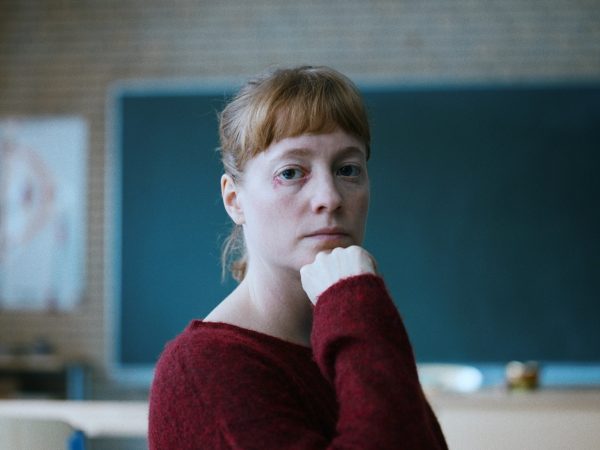
Our beliefs are powerful tools for shaping the world we experience. They can be employed to manifest virtually anything we can envision, for better or worse. Consequently, though, it’s incumbent upon us to use that power carefully, because, as this film illustrates, it can quickly get out of hand, becoming inflated in ways with wide-ranging and potentially damaging ramifications. After all, those mountains can be difficult – if not impossible – to dispense with once they emerge. Remember that the next time you’re quick to unduly raise a fuss or erroneously point fingers at someone else.
In recent years, we’ve all seen examples of incidents that start out comparatively small but that rapidly get blown all out of proportion – and perversely so at that. As developments emerge and explode under these conditions, they often lose all sense of reason, expanding into tangential and seemingly unrelated areas that have virtually nothing to do with the event that spawned them. And, in the end, we’re left with outcomes that seem inappropriate and ill-suited to what launched these insane scenarios in the first place. That’s what writer-director Ilker Çatak explores in his latest offering, a microcosmic metaphor for what’s happening on a wider scale in society at large today. While some may fervently contend that the outcomes depicted here are somewhat exaggerated in nature, they nevertheless collectively draw attention to undeniably troubling issues desperately in need of attention in our increasingly out-of-control world, global concerns that obviously transcend national borders, all punctuated here with more than a few hefty infusions of wickedly absurdist humor. “The Teachers’ Lounge” might not appeal to everyone, but, for those who enjoy films that aren’t afraid to present biting social commentary, this should be added to your watch list. As the picture so regrettably shows, even supposedly civil environments aren’t immune from the kind of social nonsense depicted here, a troubling teaching for all of us who are looking for a return to sanity in an increasingly crazy existence.
“The Teachers’ Lounge” has played widely on the film festival circuit, but it is now available in limited general release. As one of the National Board of Review’s Top 5 International Films for 2023, it’s a worthwhile watch that will make viewers think and, even more importantly, laugh. It’s such qualities that have also earned this release a well-deserved Oscar nomination for best international film. But, as you’re watching it, try to keep your composure and not let emotions take over if it starts to make you feel uncomfortable. That’s the lesson we should all strive to take away from this insightful offering – and apply it when called for.
Copyright © 2024, by Brent Marchant. All rights reserved.

No comments:
Post a Comment